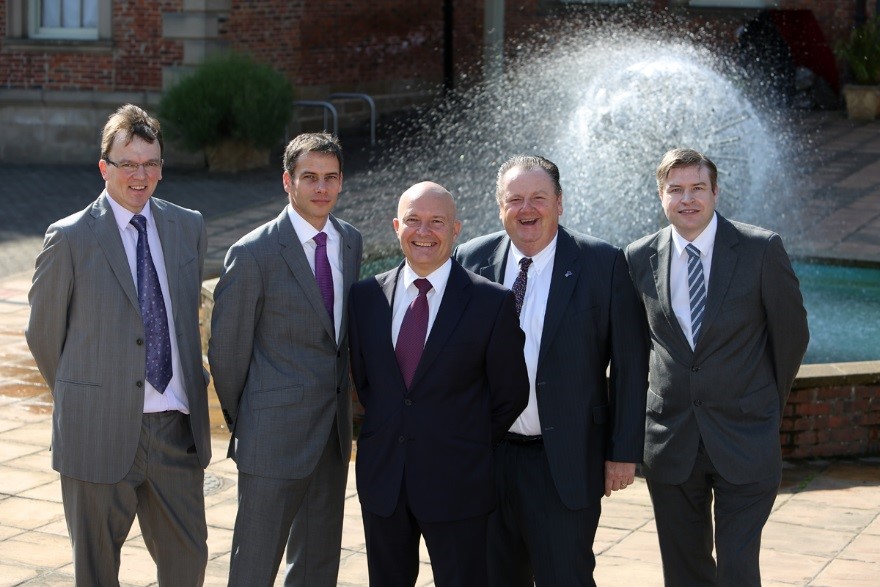Insights and Commentaries
Teesside Collective blueprint for Industrial CCS in the UK
15th July 2015
Topic(s): Carbon capture, Economics, Engineering and project delivery, use and storage (CCUS)
Carbon capture and storage (CCS) is the only available technology for eliminating emissions from many current industrial processes. The Teesside Collective is a group of industrial operators in the Tees Valley region of North East England who have come together to design and propose a CCS cluster (or 'hub') that allows multiple sources of CO2 to use a common transport and storage infrastructure. In two separate events the Teesside Collective recently launched a number of key publications detailing the research to-date on this world first project. The Institute's Andrew Purvis, General Manager for Europe, Middle East and Africa presented at the launch.

L-R: Keith Brudenell (GrowHow), John Baker (Lotte Chemical), Neil Kenley (Tees Valley Unlimited), Stan Higgins (NEPIC) and Andy Purvis (Global CCS Institute) at the launch of the Teesside Collective reports in Tees Valley. Picture credit: www.teessidecollective.co.uk
This week saw the release of a suite of publications by the Teesside Collective, a cluster of leading industries with a shared vision: to establish Teesside as the go-to location for future clean industrial development by creating Europe’s first Carbon Capture and Storage (CCS) equipped industrial zone.
In the last week the Collective organised two launch events, in London and in Teesside.
The London event, held in the shadow of Big Ben, brought together a panel of Tees Valley-based and national stakeholders and included speeches from;
- Lord Bourne, Parliamentary Under Secretary of State, Department of Energy and Climate Change (DECC)
- Paul Booth, OBE of SABIC UK and Tees Valley Unlimited
- Matthew Bell, Chief Executive, Committee on Climate Change
- Emma Pinchbeck, World Wildlife Fund (WWF) United Kingdom (UK).
Lord Bourne spoke positively about the role CCS, and Industrial CCS in particular will play as part of the UK's low carbon future, and described the report as an important landmark in the development of industrial CCS in the UK, while praising the Tees Valley’s ambition to remain a thriving industrial presence in a carbon constrained future.
Emma Pinchbeck, Head of Climate Change and Energy at WWF UK also spoke positively of the role of Industrial CCS. Other Environmental Non-Governmental Organisations (ENGOs), including some who have traditionally been sceptical of CCS have welcomed the project. Quoted on the BBC Simon Bowens, North East campaigner for Friends of the Earth said; "The carbon capture proposals are really welcomed. It is very difficult for these companies to decarbonise at the rate we need them to, CCS is the most likely solution to be able to do that effectively.”
The Teesside event brought together local stakeholder representatives – from industry and government, and was opened by Neil Kenley of Tees Valley Unlimited, one of the key facilitators of the Teesside Collective.
Keith Brudenell, of GrowHow discussed the importance of the project to the region, described the significant implications for Teesside industry and the positive outcomes for GrowHow. As a producer of fertilisers, Growhow’s process already separates CO2, and just needs the provision of a storage and infrastructure solution. Keith also outlined the opportunities for inward investment, growth and jobs the project could bring due to the increased competitiveness of the Teesside Region.
John Baker, Lotte Chemical focused on market drivers, and gave an overview of the customer angle – describing how Teesside’s process industries feed the wider low carbon economy and how customers, such as Coca-Cola and Britvic, are increasingly keen on decarbonising their supply chains. John saw the ability of companies on Teesside to ‘plug in’ to the CCS network as providing a competitive advantage over suppliers in other regions.
Stan Higgins of NEPIC passionately set out the importance of reducing carbon emissions so that industry can stay competitive in the global marketplace. He saw the project as being far more positive than ‘do or die’, as the infrastructure would attract inward investment to grow the UK industrial base.
Finally, in my presentation I put the Teesside initiative in the context of other Industrial CCS developments around the world, and explained that the project should be seen as a global first in industrial carbon capture and storage, and good not only for the local area but also showing that the UK is leading the way in decarbonising heavy industry. I welcomed the ‘bottom up’ nature of the initiative and congratulated the Teesside Collective and the UK Government for their vision in supporting and funding the project, and we at the Global CCS Institute look forward to the project taking the next step towards realisation.
CCS has a key role to play as part of the world’s low carbon future, in power and in industry. The Teesside Collective represents a tremendously important step toward the realisation of CCS equipped low carbon industrial zones. The project has already attracted the attention of the European Parliament and Commission and is being closely watched by other industrial areas around Europe and further afield.
The Teesside Collective’s Blueprint for Industrial CCS in the UK can be found here.